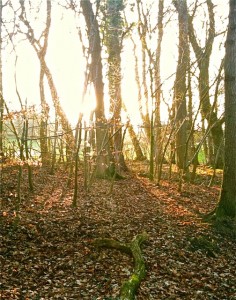If you go down to the woods today
I have found my feet. Literally. The new flexibility I’m enjoying with my business has allowed me to rediscover the benefits of walking. Especially walking in the countryside – through woods, away from the busy streets. Such apparently frivolous activity has tangible benefits: without wanting to state the absolutely obvious, it is good for you. Not just physically but mentally too.
Stephen Kaplan’s research (pdf) describes the benefit as Attention Restoration Theory. It states that interacting with nature dramatically improves cognitive function (compared to being in a urban environment). In a post on Science Blogs, Jonah Lehrer explains “that nature, unlike a city, is filled with inherently interesting stimuli (like a sunset, or an unusual bird) that trigger our involuntary attention, but in a modest fashion. Because you can’t help but stop and notice the reddish orange twilight sky – paying attention to the sunset doesn’t take any extra work or cognitive control – our attentional circuits are able to refresh themselves.” In contrast, urban environments demand our attention giving us little mental space to rest and reflect. In an article for the New York Times (pdf), Lehrer goes on to speculate that these same physio-neurological responses might also help us think up new ideas.
It’s an exciting thought. And obviously there’s no substitute for the real thing but it seems that we can fake it if necessary.
Dave Munger talks about replicating ‘natural’ environments inside rooms to improve the effects of a study break. Apparently even murals of natural scenes have a greater positive impact on our cognitive ability than the more normal window view of another building.
If it can work with murals, how else might we manufacture it? It’s made me wonder how else we could achieve these benefits in circumstances that are far away from those woody glades. And not just in physical spaces. Virtual ones too. The increasing busyness of our online lives gives us less time and space to concentrate on one thing, let alone reflect on it. This isn’t just about formal or informal learning online, it’s about satisfaction and meaning generally.
Maybe there are lessons we can draw from our ‘biophilia,’ the tendency to prefer natural things. Can we incorporate the textures, colours, sounds and rhythms of nature into digital content in a way that seduces our brains? Can we recreate nature’s ‘structure’ to improve our synthetic experiences? It’s an intriguing thought.
I think I need another stroll.

